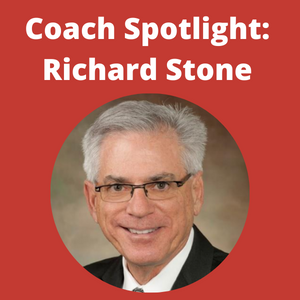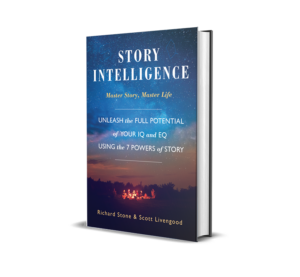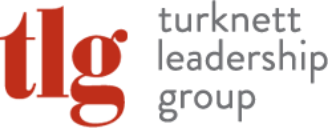
By the Turknett Team
Every month we shine the spotlight on one of our expert consultants. We aim to highlight the diversity and variety of backgrounds that make up the best leadership development team in the Southeast. This month, we decided to get together with Richard Stone, our Chief Storyteller and Strategic Partner, to ask him a few questions on, you guessed it, storytelling! Read on as Rick shares his incredible insights and about his role with TLG.
Why is storytelling so impactful?
 Our brains are literally wired for story. In fact, after hundreds of thousands if not millions of years of evolution, it’s unclear which came first, our brains or our ability to tell and digest stories. We spend a lot of time in training circles discussing learning styles but that’s a challenge for any trainer working with multiple people. Because storytelling contains all three primary “food” groups—listening/hearing, visualization, and kinesthetics—it’s powerfully suited to reaching the most people most of the time. Another point of interest—the areas of our brains that we use for memory and retrospection are in fact the same areas of our brains we use for visualizing the future. It may in fact be the case that memories are there to serve our prospective thinking to make us better at planning and enacting the future we desire.
Our brains are literally wired for story. In fact, after hundreds of thousands if not millions of years of evolution, it’s unclear which came first, our brains or our ability to tell and digest stories. We spend a lot of time in training circles discussing learning styles but that’s a challenge for any trainer working with multiple people. Because storytelling contains all three primary “food” groups—listening/hearing, visualization, and kinesthetics—it’s powerfully suited to reaching the most people most of the time. Another point of interest—the areas of our brains that we use for memory and retrospection are in fact the same areas of our brains we use for visualizing the future. It may in fact be the case that memories are there to serve our prospective thinking to make us better at planning and enacting the future we desire.
What’s the danger in not telling your story?
In my work, I have discovered that the sharing of our stories plays crucial roles in meaning-making as well as building trust in our relationships. It turns out that knowing our stories is essential to understanding our personal journey and making sense or meaning out of it. And it turns out that when we know another’s story it elicits in us compassion for their challenges as well as generally empathy for them as people. If we don’t know a person’s story then we will fill the void and project a story onto them, true or not. Usually, not! And that has tremendous consequences for trust-building and teams working well together.
Tell us about your new book!

Over the past thirty-plus years in working with story in healthcare, organizations, and with individuals, I have come to see how essential it is to every facet of human existence. In fact, we have concluded that there is a kind of “story intelligence” that is more primary than EQ or IQ. In addition, as we have seen the many ways story impacts every facet of human affairs, we have identified what we believe are 7 Powers of Story. Those who master these powers we believe will have an important advantage in every phase of their personal and professional lives.
How can organizations collect and share their story?
Most of us have undoubtedly had a wide array of experiences that potentially could become powerful stories that can be used to influence and impact various stakeholders. Here’s a series of questions that may prompt you to remember events and anecdotes that can be turned into usable stories:
What has been your organization’s biggest setback, and how did you overcome or solve the problem?
1.) Who are the people in your organization that you admire the most? Why?
2.) Which of your staff members has impressed you the most? Why? What have they done to win your admiration and respect?
3.) What stories have you heard within the organization that made the biggest impression?
4.) What is the most outstanding story that you have ever heard that expresses your mission and values?
Your co-workers can also be a source of important stories which you can add to your organization’s repertoire. First, to find these stories requires that your staff knows that you’re in the market for a good tale that illustrates an important organizational value and involves some degree of heroism. Second, ask each of your staff members, from the secretary on up, if they have a good story for you. And, on a regular basis seek new stories. It’s a good way to stay in contact with all your staff.
Can you give us an example of an organization that uses storytelling to have a big impact?
Not to be flip, but every organization is either consciously or unconsciously using story. Every company has a story, has key storytellers who are shaping the company’s narrative and culture, and exerting a strong influence that can either support leaders’ goals or subvert them.
With that said, one of the best examples I can share with you is the World Bank. My colleague Steve Denning used storytelling—a particular story form that he dubbed a Springboard Story—to engage leaders with a change idea to move them back into becoming a knowledge-sharing institution. Within the space of about three years, they went from having no knowledge-sharing functions to being recognized as one of the world’s best. It all came about through his sharing of a rudimentary story of how one health worker in an NGO in a developing country was able to use the internet to find the knowledge to avert a major health disaster in his town. That story engaged leaders powerfully with the idea that the internet could be harnessed to share the Bank’s knowledge with its clients around the world.
Can you tell us a little bit about the hero’s journey and how organizations can leverage it?
 Joseph Campbell wrote extensively on this archetypal story form that shows up in every culture and he called it the “hero’s journey.” Embedded in this journey is a deep understanding of the ups and downs of life as we pursue meaningful goals. There’s also an understanding that even during the dark times, what he called the dark night of the soul, it is a journey filled with change, and even stormy times give way to calm and regeneration.
Joseph Campbell wrote extensively on this archetypal story form that shows up in every culture and he called it the “hero’s journey.” Embedded in this journey is a deep understanding of the ups and downs of life as we pursue meaningful goals. There’s also an understanding that even during the dark times, what he called the dark night of the soul, it is a journey filled with change, and even stormy times give way to calm and regeneration.
The Hero’s Journey is a useful template for understanding our own growth cycles, and when applied to the life of an organization, it can provide a useful map for understanding big wins and devastating failures. When we all see that it’s part of a never-ending story, we can wake each morning and wonder what’s next and more importantly, what role do we individually and collectively want to play in creating the best story possible for ourselves and our organizations.
Why did you choose TLG as a strategic partner?
Working with TLG has been a natural fit from the first time I met TLG’s leadership. More importantly, I felt that TLG is the most respected professional development organization in the Southeast. I am honored that they have seen the value of what I can bring to their clients.

